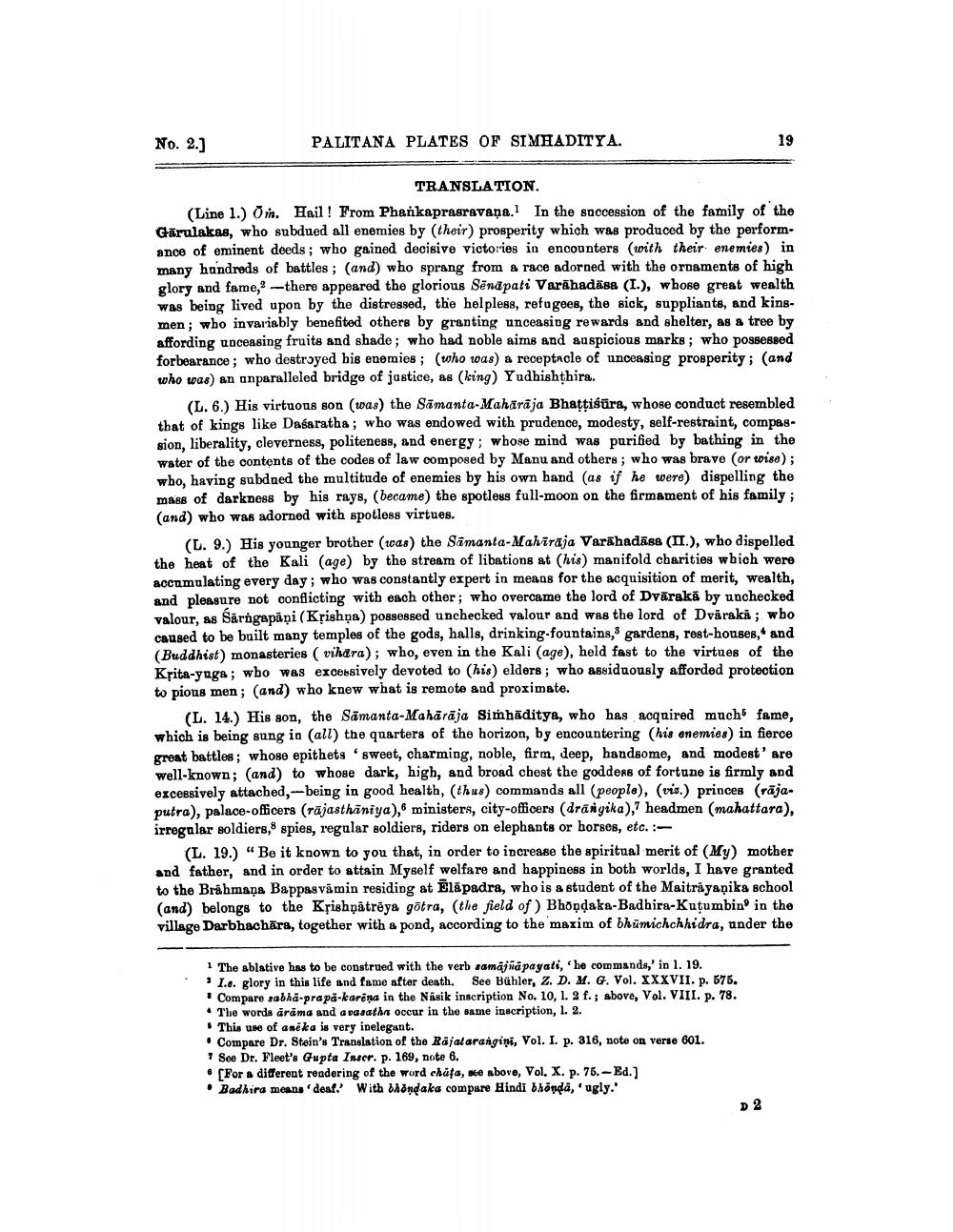________________
No. 2.)
PALITANA PLATES OF SIMHADITYA.
TRANSLATION (Line 1.) Om. Hail! From Phankaprasravana. In the succession of the family of the Gārulakas, who subdued all enemies by (their) prosperity which was produced by the performance of eminent doeds; who gained decisive victories in encounters (with their enemies) in many hundreds of battles ; (and) who sprang from a race adorned with the ornaments of high glory and fame, there appeared the glorious Senapati Varahadisa (I.), whose great wealth was being lived upon by the distressed, the helpless, refugees, the sick, suppliants, and kingmen; who invariably benefited others by granting unceasing rewards and shelter, as a tree by affording unceasing fruits and shade; who had noble aims and auspicious marks; who possessed forbearance; who destroyed his enemies; (who was) a receptacle of unceasing prosperity; (and who was) an unparalleled bridge of justice, as (king) Yudhishthira.
(L. 6.) His virtuous son (was) the Samanta-Mahārāja Bhattiśūra, whose conduct resembled that of kings like Dasaratha; who was endowed with prudence, modesty, self-restraint, compassion, liberality, cleverness, politeness, and energy; whose mind was purified by bathing in the water of the contents of the codes of law composed by Manu and others; who was brave (or wise); who, having subdued the multitude of enemies by his own hand (as if he were) dispelling the måss of darkness by his rays, (became) the spotless full-moon on the firmament of his family; (and) who was adorned with spotless virtues.
(L. 9.) His younger brother (was) the Samanta-Mahiraja Varahadisa (IT.), who dispelled the heat of the Kali (age) by the stream of libations at (his) manifold charities which were accumulating every day; who was constantly expert in means for the acquisition of merit, wealth, and pleasure not conflicting with each other; who overcame the lord of Dväraka by unchecked valour, as Särngapani (Kộishọa) possessed unchecked valour and was the lord of Dväraka ; wbo caused to be built many temples of the gods, halls, drinking-fountains, gardens, rest-houses, and (Buddhist) monasteries ( vihara); who, even in the Kali (age), held fast to the virtues of the Krita-yaga; who was excesively devoted to his elders; who assiduously afforded protection to pious men; (and) who knew what is remote and proximate.
(L. 14.) His son, the Sämanta-Mahārāja Simhāditya, who has acquired much fame. which is being sung in (all) the quarters of the horizon, by encountering (his enemies) in fierce great battles; whose epithets sweet, charming, noble, firm, deep, handsome, and modest' are well-known; (and) to whose dark, high, and broad chest the goddess of fortune is firmly and excessively attached, ---being in good health, (thus) commands all people), (vis.) princes (rājaputra), palace-officers (rajasthaniya), ministers, city-officers (drānigika), headmen (mahattara), irregular soldiers," spies, regular soldiers, riders on elephants or horses, etc. :
(L. 19.) “Be it known to you that, in order to increase the spiritual merit of My mother and father, and in order to attain Myself welfare and happiness in both worlds, I have granted to the Brahmana Bappasvamin residing at Elāpadra, who is a student of the Maitriyanika school (and) belongs to the Krishpatreya götra, (the field of ) Bhondaka-Badbira-Kutumbin in the village Darbhachira, together with a pond, according to the maxim of bhumichchhidra, under the
The ablative has to be construed with the verb samajñā payati, 'he commands,' in 1. 19. 1... glory in this life and fame after death. See Bühler, Z. D. M. G. Vol. XXXVII. p. 575.
Compare sabha-prapa-karena in the Nasik inscription No. 10, 1. 3 f. ; above, Vol. VIII. p. 78. • The words arama and a vasathn occur in the same inscription, 1. 2.
This use of aneka is very inelegant. . Compare Dr. Stein's Translation of the Rajatarangini, Vol. I. p. 316, note on verse 601. 7 See Dr. Fleet's Gupta Inscr. p. 169, note 6. . [For a different rendering of the word chata, se above, Vol. X. p. 75.- Ed.] • Badhira means 'deal' With bhondaka compare Hindi bhonda, ugly."
D 2




